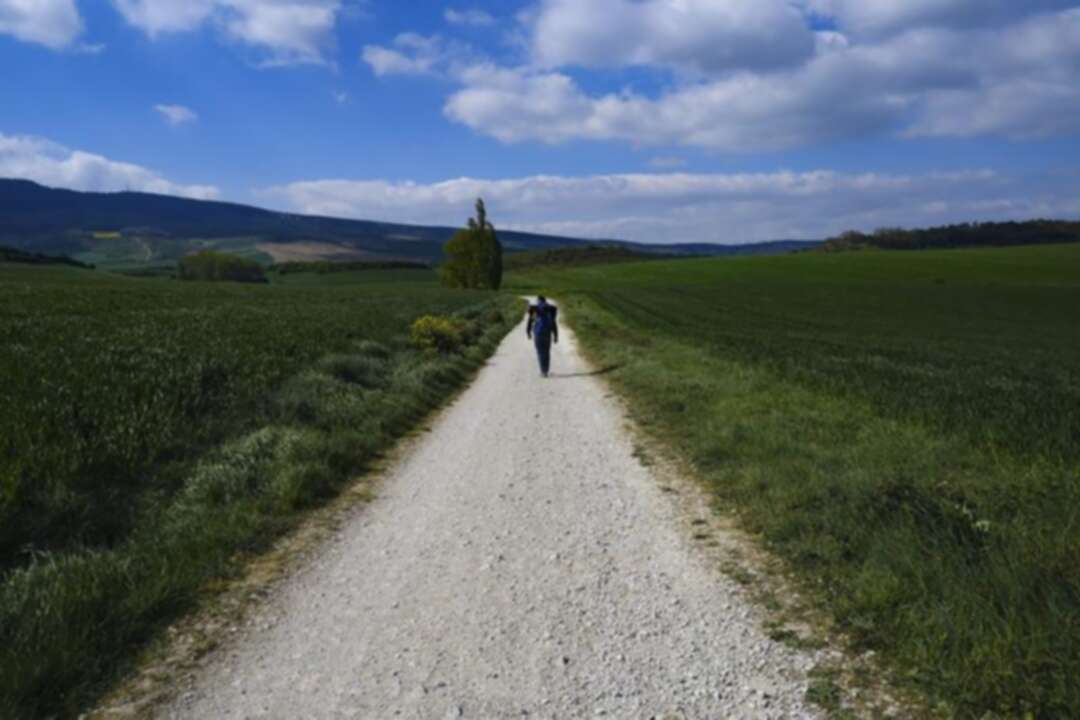-
The Camino de Santiago pilgrim’s path returns for those who hope to heal wounds

Committing to the pilgrim’s path has for centuries been a source of renewal for those willing to put their lives on hold and spend days, weeks or even months crossing Spain along the Camino de Santiago, a journey that takes hikers to the reported burial place of the apostle St. James.
But after a year of being kept off the Way of St. James due to pandemic-related travel restrictions, soul-searchers hoping to heal wounds left by the coronavirus are once again strapping on backpacks and following trails marked with a seashell emblem to the shrine in the city of Santiago de Compostela.
The Camino de Santiago is actually a series of paths that fan out beyond the Iberian Peninsula and spread across Europe. Whichever route one takes, they all end at the Santiago’s baroque cathedral, where believers can visit what is said to be the tomb of James, the apostle who, according to Catholic tradition, brought Christianity to Spain and Portugal.
The pilgrimage has its roots in the alleged discovery of the tomb in the 9th century. Pilgrims have come to Santiago for a millenium, but the number of both believers and non-believers making the trip boomed in recent decades after regional authorities revived the route.
It is now supported by a wide network of religious and civic organizations and served by public and private hostels at prices for all pocketbooks.
Over 340,000 people from all over the world walked “El Camino” in 2019. Only 50,000 walked it last year, when Spain blocked both foreign and domestic travel except for during the summer months.
Before a state of emergency that limited travel between Spain’s regions ended on May 9, only a handful of Spanish pilgrims were arriving in Santiago each day and registering with the Pilgrim’s Reception Office to receive their official credential for having completed the pilgrimage.
Mental health experts agree that the pilgrimage can lead to emotional healing for both faithful Roman Catholics and the large number of non-Catholics who are drawn to make one. Dr. Albert Feliu, a health psychologist and lecturer at the Autonomous University of Barcelona, said to AP preliminary results from a survey of 100 pilgrims point to a reduction of stress and depression that surpass those seen after regular vacations.
You May Also Like
Popular Posts
Caricature
BENEFIT Sponsors BuildHer...
- April 23, 2025
BENEFIT, the Kingdom’s innovator and leading company in Fintech and electronic financial transactions service, has sponsored the BuildHer CityHack 2025 Hackathon, a two-day event spearheaded by the College of Engineering and Technology at the Royal University for Women (RUW).
Aimed at secondary school students, the event brought together a distinguished group of academic professionals and technology experts to mentor and inspire young participants.
More than 100 high school students from across the Kingdom of Bahrain took part in the hackathon, which featured an intensive programme of training workshops and hands-on sessions. These activities were tailored to enhance participants’ critical thinking, collaborative problem-solving, and team-building capabilities, while also encouraging the development of practical and sustainable solutions to contemporary challenges using modern technological tools.
BENEFIT’s Chief Executive Mr. Abdulwahed AlJanahi, commented: “Our support for this educational hackathon reflects our long-term strategic vision to nurture the talents of emerging national youth and empower the next generation of accomplished female leaders in technology. By fostering creativity and innovation, we aim to contribute meaningfully to Bahrain’s comprehensive development goals and align with the aspirations outlined in the Kingdom’s Vision 2030—an ambition in which BENEFIT plays a central role.”
Professor Riyadh Yousif Hamzah, President of the Royal University for Women, commented: “This initiative reflects our commitment to advancing women in STEM fields. We're cultivating a generation of creative, solution-driven female leaders who will drive national development. Our partnership with BENEFIT exemplifies the powerful synergy between academia and private sector in supporting educational innovation.”
Hanan Abdulla Hasan, Senior Manager, PR & Communication at BENEFIT, said: “We are honoured to collaborate with RUW in supporting this remarkable technology-focused event. It highlights our commitment to social responsibility, and our ongoing efforts to enhance the digital and innovation capabilities of young Bahraini women and foster their ability to harness technological tools in the service of a smarter, more sustainable future.”
For his part, Dr. Humam ElAgha, Acting Dean of the College of Engineering and Technology at the University, said: “BuildHer CityHack 2025 embodies our hands-on approach to education. By tackling real-world problems through creative thinking and sustainable solutions, we're preparing women to thrive in the knowledge economy – a cornerstone of the University's vision.”
opinion
Report
ads
Newsletter
Subscribe to our mailing list to get the new updates!






















